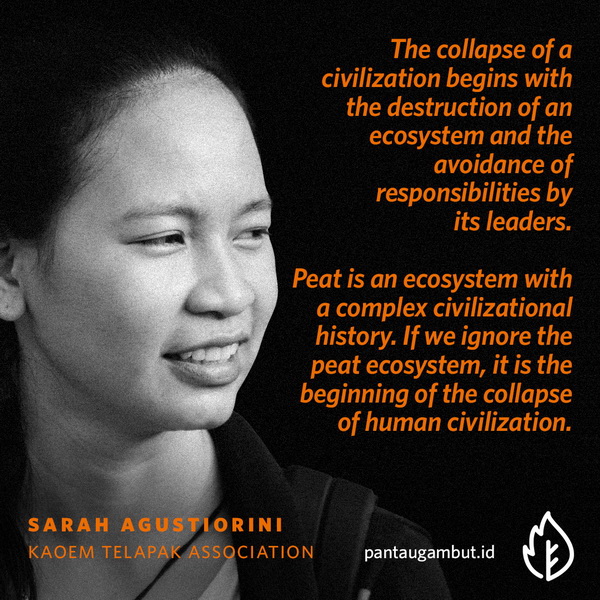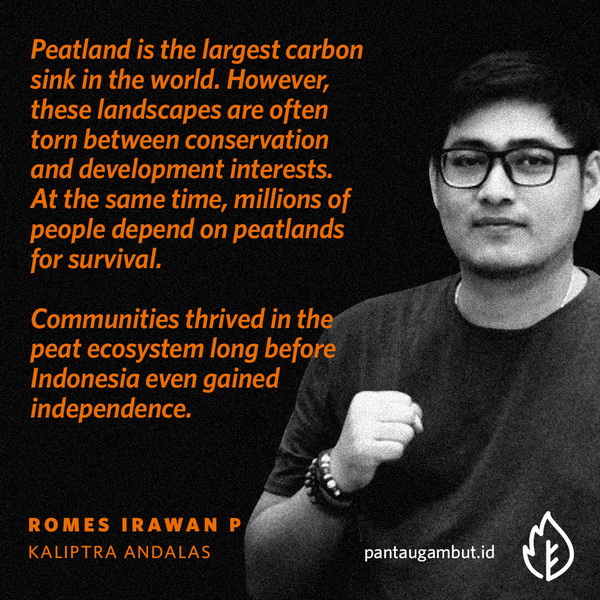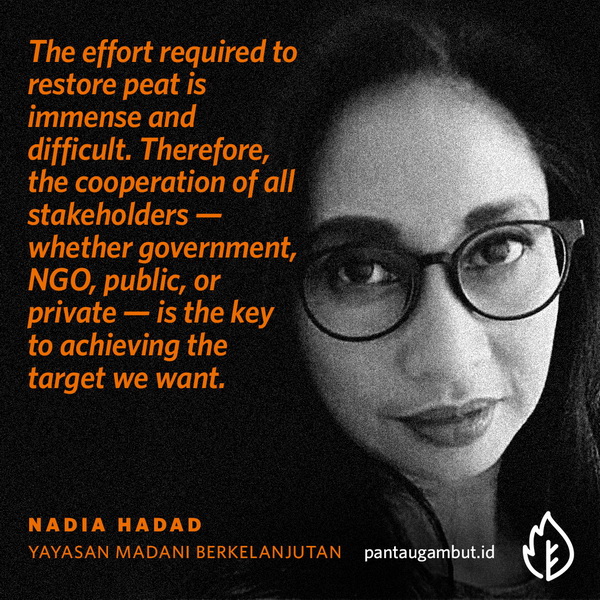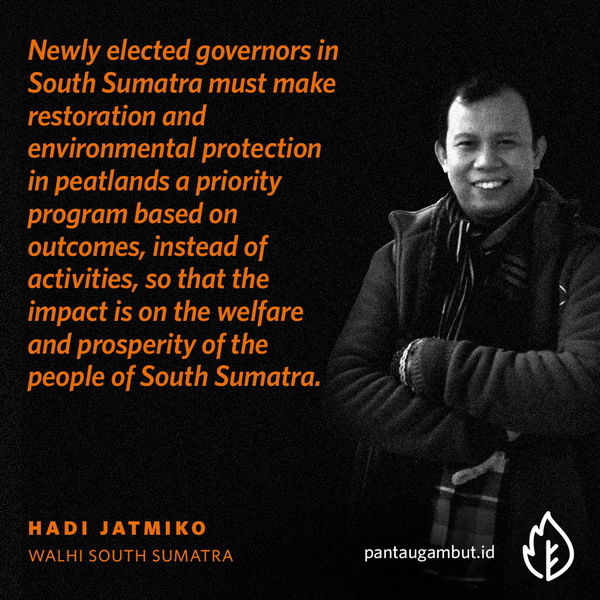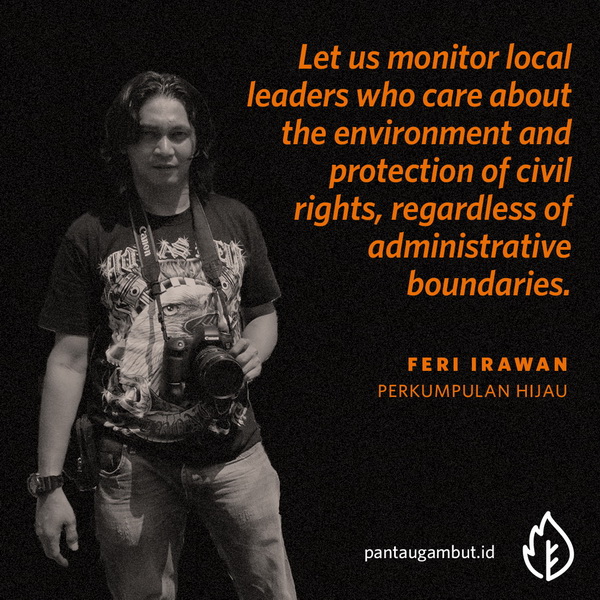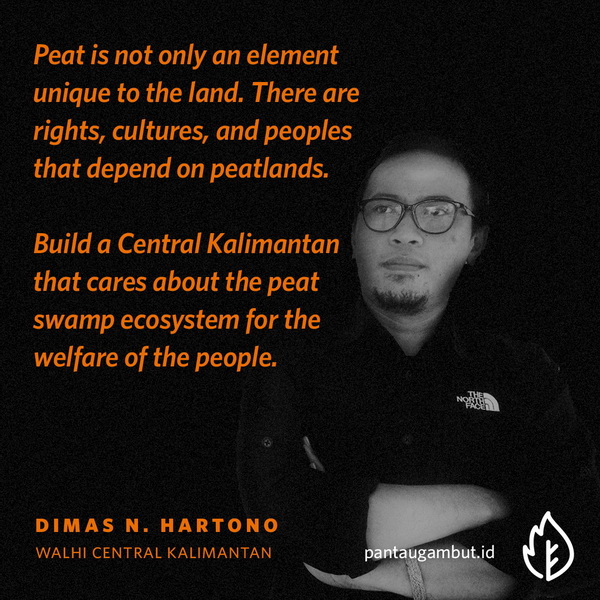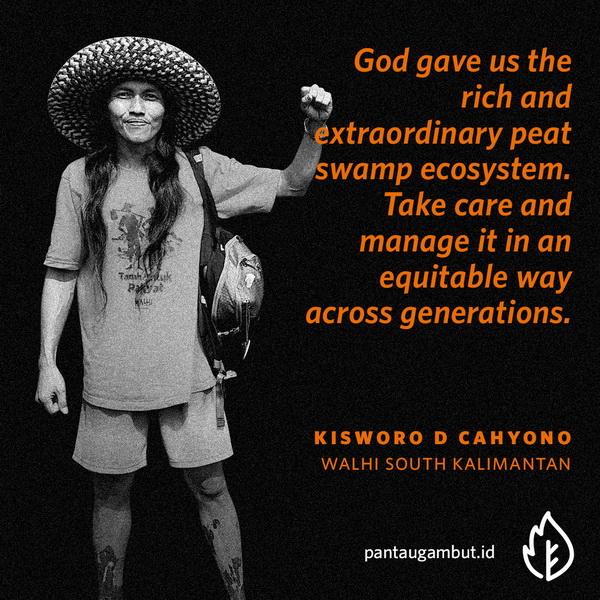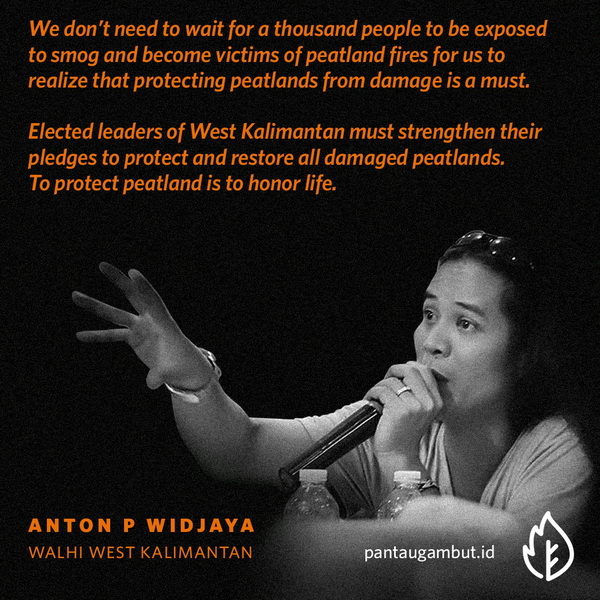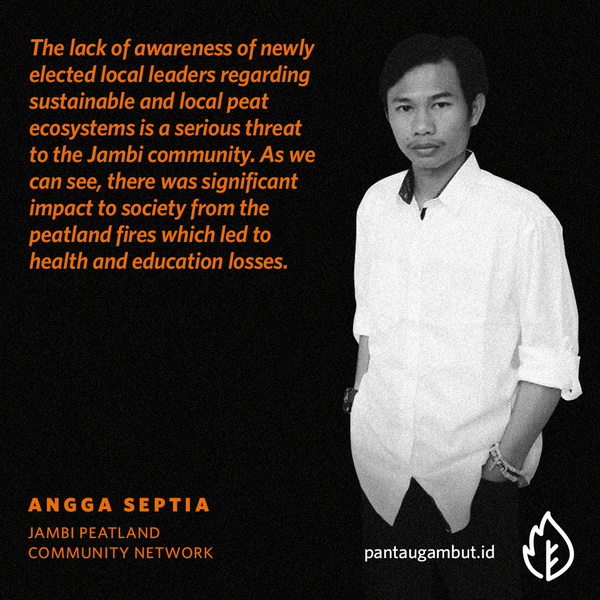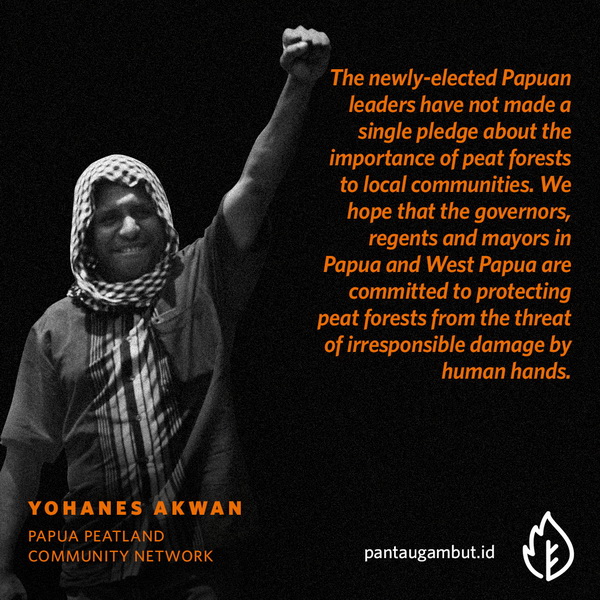Talang Tuwo Inscription, Local Wisdom Protects Peat Ecosystem (2)
By Parliza HendrawanThe Struggles of “Gambut Avengers” During 2018 Gubernatorial Elections
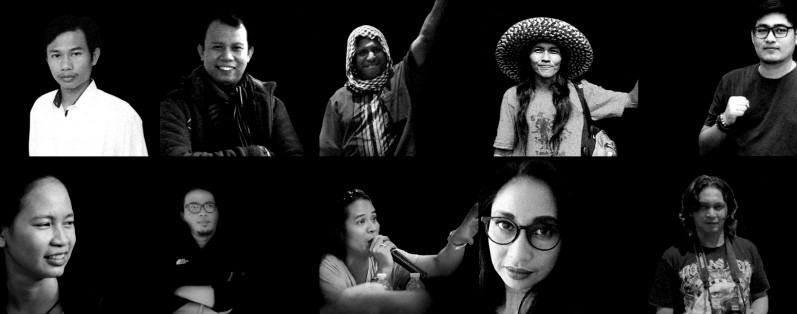
During the 2018 gubernatorial elections, environmental issues were not a priority for candidates. Civil society plays an important role in pushing candidates to recognize that environmental issues, especially peatland issues, affect not only the environment, but also the survival and livelihoods of local people. That’s where the “Gambut Avengers” come in.
Environmental issues, especially peat restoration, become very important during regional elections, because they reveal how candidates understand the environmental conditions of the area they will govern.
During the 2018 gubernatorial elections, environmental issues were not a priority issue for candidate pairs in various regions of Indonesia. Therefore, the public and civil society organizations’ roles are crucial to compelling candidates to realize that environmental issues, especially in peatlands, not only affect the environment, but also the wellbeing and welfare of local communities. Cooperation is needed from various parties in the effort to fight for peatland restoration.
The "Gambut Avengers" (Peat Avengers) have contributed to building public awareness about the importance of peatland restoration. So who are these Gambut Avengers who fight for peatlands?
Romesh Irawan Putra, Kaliptra Andalas
In a report entitled "Voice from the Frontlines of Peatland Protection in 7 Provinces: Evaluation on 2 Years of Peatland Restoration", Romesh affirms that restoration activities in Riau do not involve the community as a whole. For example, well drilling only involves village governments, so local residents do not know the benefits of these wells or how to use them, nor do they have the tools. This is important for regional officials to take notice of, so that in the future, government programs related to peatland restoration can better involve affected communities.
Unfortunately, for the four candidate pairs who ran for Riau Governor in 2018–2023, the issue of peatland restoration was not a primary topic. Although there were candidate pairs who addressed the issue of forest and land fires, there was no mention of a vision, mission, or program that would demonstrate their commitment to realizing peatland restoration.
Romesh and other Gambut Avengers from Kaliptra Andalas are working to raise candidates’ and the public’s awareness on the importance of peat restoration. One way they are doing this is by conducting a social media campaign that highlights peatland’s role in the survival and livelihoods of local people, as well as the importance of choosing leaders who care about peatland. Their aims are to realize the people’s sovereignty in the management of natural resources, save peatland ecosystems, and give recognition to indigenous communities living in peatlands.
In addition, Romesh and the Gambut Avengers from Kaliptra Andalas encourage national and local policies to protect peatland ecosystems by supporting peatland communities through the Social Forestry (PS) and Land Objects for Agrarian Reform (TORA) [Indonesian] schemes. This is in line with the government’s 9-million-hectare agrarian reform program, wherein 4.5 million hectares will be distributed to farmers through an asset legalization scheme and 4.5 million hectares through land redistribution. In addition to TORA land, the government has a 12.7-million-hectare PS program planned for cooperatives, farmer’s groups, and farmer’s associations.
All efforts were made by Romesh and Kaliptra Andalas to ensure the people's sovereignty in the management of natural resources is supported by policies that center the interests of the people and environmental sustainability.
Angga Septia, Jambi Peatland Community Network
Like Romesh with Kaliptra Andalas, Angga Septia is working with the Jambi Peatland Community Network (JMGJ) to prevent forest and land fires and protect peatlands by integrating peatland protection in the mayor of Jambi’s strategic agenda. Together with other Gambut Avengers, Angga supports the use of an early warning system through task forces (SATGAS) to minimize the impact of fires.
Unfortunately, Angga's efforts with the Gambut Avengers in Jambi are not always smooth sailing. The mayor of Jambi’s lack of understanding about the importance of peatland restoration makes it difficult to integrate peatland protection in the mayor's strategic plan. In fact, healthy peatlands can have a positive impact on human health, and they ensure the availability of water for Jambi communities.
Hadi Jatmiko, WALHI South Sumatra
In South Sumatra, Hadi Jatmiko and WALHI Regional Council are also fighting for peatland restoration during the 2018 elections by encouraging candidates to include the issue in their work programs. Local candidates have not put forth any peatland protection or restoration programs, thus continuously exposing natural resources to exploitation.This will affect the safety and welfare of the people, and one of the pledges echoed by local leaders is to realize the prosperity of the people.
Anton P. Widjaya, WALHI West Kalimantan
The lack of public awareness and weak contributions from candidates on peatland restoration prompted Anton and WALHI West Kalimantan to voice peatland issues during the 2018 elections. Anton become a panelist on the second West Kalimantan 2018 candidate debate on Sustainable Development and Natural Resource Management. Along with other Gambut Avengers from WALHI West Kalimantan, Anton also conducted campaigns on social media and local mass media about issues related to peatland restoration and water resource management (PSDA).
WALHI forged discussions and partnerships with other civil society organization networks to fight for environmental issues, particularly related to peatlands and PSDA. Anton hopes that peatlands will be a priority issue in West Kalimantan PSDA, so that regional candidates are pushed to understand and commit to protecting peatlands.
Yohanes Akwan, Papua Peatland Community Network
Yohanes Akwan and his friends are members of the Papua Peatland Community Network. These Gambut Avengers established a Pantau Gambut Local Network in Raja Ampat Regency, West Papua in April 2017, representing multiple civil society organizations across Papua and West Papua.
As coordinators of the Pantau Gambut Local Network in Papua, Yohanes and his team members agreed to divide their work into three areas: Papua and West Papua, with West Papua divided into the Manokwari Raya and Sorong Raya subregions. This helps to ensure smooth coordination and clarify monitoring authority.
Regarding the 2018 gubernatorial elections, Pantau Gambut Local Network in Papua analyzed the visions and missions of the two gubernatorial candidate pairs in Papua and West Papua, as well as regent and deputy regent candidates in their respective administrative areas. The analysis revealed a lack of follow-through from the candidate pairs who had mentioned peat protection and restoration. In addition, the Gambut Avengers in Papua analyzed regional spatial maps and plan to publish their findings to shed light on peat restoration issues among the public and prospective regional leaders.
However, they face some challenges in their efforts. One hurdle is leaders who show little concern for peatlands. The only thing that can be done about this is to monitor candidates’ campaign promises and continue to encourage the government to raise awareness about the importance of peatland restoration issues.
Another challenge is the public's lack of understanding about the impact of forest fires. Due to the remoteness of fire hot spots, access to information about the consequences of fires is limited.
On top of that, there is a lack of transparency regarding dubious forestry practices in policy documents. The central government has not assisted with the regional implementation of peatland restoration policies. These issues make it difficult for the Gambut Avengers in Papua to continue campaigning for peatland restoration issues.
The Pantau Gambut Local Network in Papua has been shaped by discussions with stakeholders; public campaigns in social, local, and national media; and research on peatland restoration. Their aim is to see the central government intervene through policy changes and local candidates integrate peatland issues in every policy they make. They are also pushing for transparency and support in data collection, as these are crucial to monitoring the implementation of peatland restoration policies.
Sarah Agustiorini, Kaoem Telapak Association
Unlike the other Gambut Avengers, Sarah and the Kaoem Telapak Association have not conducted any activity related to the 2018 elections. However, they continue to make their best effort to protect peatlands, namely by monitoring the Indonesian Sustainable Palm Oil System (ISPO) and illegal logging. The ISPO itself is an Indonesian government policy that aims to improve the competitiveness of Indonesian palm oil in the global market and fulfill the president's pledge to reduce greenhouse gases. By monitoring the ISPO, Sarah and other Gambut Avengers can ensure that oil palm plantations will not encroach on peatland ecosystems.
Dimas N. Hartono, WALHI Central Kalimantan
From Central Kalimantan comes Dimas with WALHI Central Kalimantan, who fought to protect peatlands during the 2018 elections by making a short video calling for people to vote for leaders who care about the environment and peatlands. On top of that, Dimas and WALHI Central Kalimantan spoke on Radio Republik Indonesia (RRI) of Central Kalimantan about candidates who did not include environmental issues, especially peatland restoration, in their visions and missions. Dimas carried out discussions with academics, government officials, and civil society organizations to raise public awareness about the importance of sustainable peatland management.
Publications, social campaigns, public discussions, advocacy, and monitoring the implementation of peatland restoration all aim to change how local leaders see peatland issues. Dimas hopes that the government will give more attention to the environment in Central Kalimantan, which is now in critical condition due to mining permits and poor spatial planning that does not protect peatlands.
Kisworo Dwi Cahyono, WALHI South Kalimantan
Another Gambut Avenger who fought for peatlands during the 2018 elections is Kisworo Dwi Cahyono. In South Kalimantan, the main challenge is the candidates’ lack of awareness regarding environmental issues and peat swamp ecosystems. But this challenge does not discourage this Gambut Avenger. He and other Gambut Avengers built networks to protect the environment and preserve peat swamp ecosystems by encouraging the regional government to engage in pro-environment and equitable, intergenerational development across generations.
Together with WALHI South Kalimantan, Kisworo maintains that elections can spark momentum to save the environment and peat swamp ecosystems. The election is a critical opportunity for citizens of South Kalimantan to choose a leader who responds seriously to ecological disasters and agrarian conflicts.
“WALHI encourages the candidates to solve the problems in the region, particularly in managing environmental issues, ecological disasters, agrarian conflicts, and public safety," Kisworo told the news editor of Kabar Kalimantan. Kisworo hopes that their struggle will awaken the government and society to how important it is for peatland issues to be incorporated into government programs.
